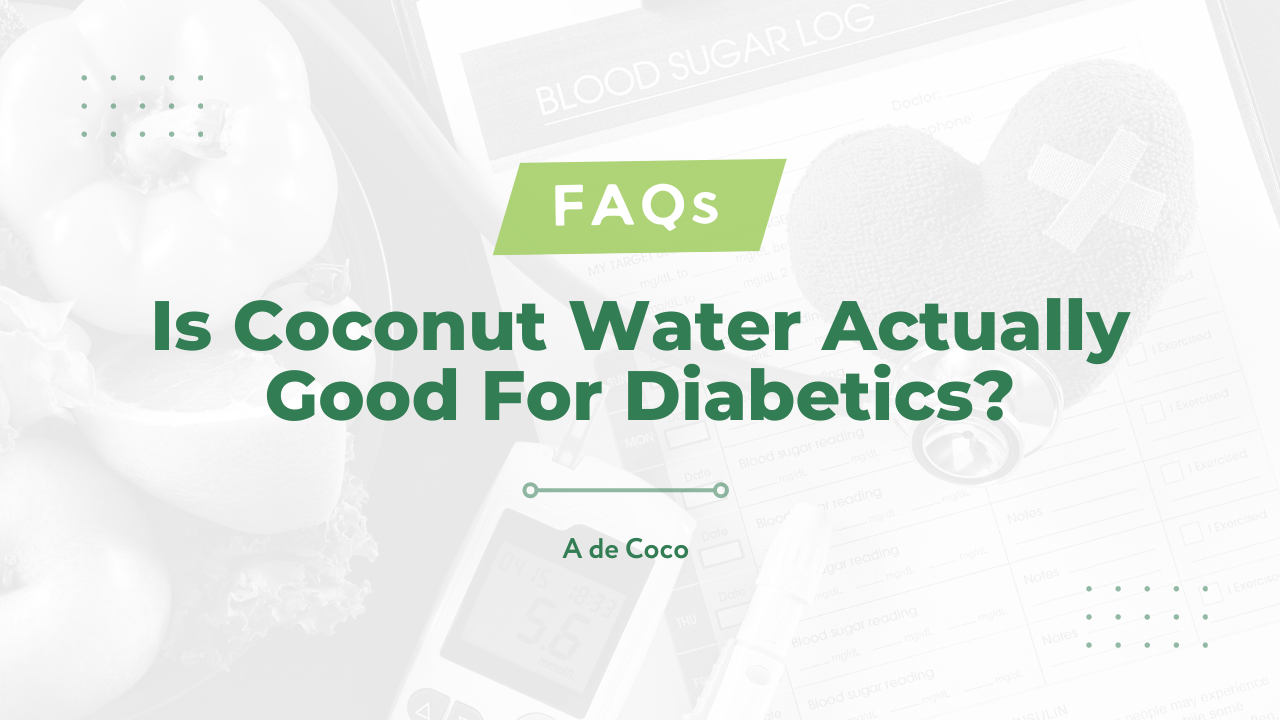The rising prevalence of diabetes worldwide has compelled individuals and health practitioners alike to seek healthier beverage alternatives.
Amid an array of options, coconut water emerges frequently, touted for its health-enhancing properties.
However, how beneficial is it for people managing their blood sugar levels?
Can this tropical treat be a reliable choice for diabetics?
The debate rages among experts and enthusiasts alike.
This exploration aims to unpack the scientific evidence and myths surrounding coconut water and its impact on diabetic individuals’ health.
Contents
- Is Coconut Water Actually Good For Diabetics?
- Understanding Diabetes and the Need for Dietary Caution
- What is Coconut Water: A Brief Overview
- Origins and Use in Various Cultures
- Nutrition Content
- Nutritional Profile of Coconut Water
- Is Coconut Water Good for Diabetes: Unveiling the Truth
- Effect of Coconut Water on Blood Sugar Levels
- How Much Coconut Water Can a Diabetic Consume?
- Role of Magnesium and Other Minerals in Coconut Water on Diabetes
- Other Health Benefits of Coconut Water
- The Downside: Potential Risks of Coconut Water for Diabetics
- The Bottom Line
Is Coconut Water Actually Good For Diabetics?
Coconut water is considered beneficial for diabetics due to its low sugar content and high content of dietary fiber, which can improve insulin sensitivity and blood sugar control. It also contains essential minerals such as magnesium, which can enhance the body’s efficiency in using insulin. However, like anything, it should be consumed in moderation as part of a balanced diet for diabetics.
Expanding upon this, it’s worth noting that we’ll delve into a comprehensive discussion about the other potential health benefits of coconut water, as well as other nutritious alternatives and dietary considerations for individuals managing diabetes.
Crucially, we will unpack the science behind why certain nutrients, like fiber and magnesium, play a pivotal role in supporting insulin sensitivity, alongside pointing out key research in the field.
This in-depth review provides a broader context, enriching your understanding of nutrition’s impact on diabetes management.
Understanding Diabetes and the Need for Dietary Caution
Diabetes is a chronic condition that affects the way in which the body processes blood sugar, or glucose.
People with diabetes either do not produce enough insulin (Type 1), or cannot effectively use the insulin their body produces (Type 2).
Maintaining a careful, balanced diet is a fundamental part of managing diabetes of all types.
This often includes monitoring carbohydrate intake, as carbs are converted into glucose during digestion, and can therefore impact blood sugar levels.
The Importance of Diet in Diabetes Management
Choosing the right foods can help maintain blood sugar levels within a target range, prevent or manage complications, and promote overall health.
It is recommended to consume a variety of nutrient-dense foods in appropriate portions, while avoiding high-sugar, high-fat, and processed foods.
Proteins, fiber-rich foods, whole grains, fruits, and vegetables are generally encouraged in a diabetic-friendly diet.
The complexity of dietary choices in diabetes makes it crucial to consider each food and drink’s nutritional profile and potential impact on blood sugar levels.
Specific foods can offer additional health benefits, such as supporting cardiovascular health or aiding weight management.
Understanding each food’s potential effect on blood sugar levels is essential for making informed dietary choices.
Drinks and Diabetes
Notably, drink choices are as important as food choices in managing diabetes.
Beverages high in sugar, such as soda and fruit juice, can quickly raise blood sugar levels, while also contributing to weight gain and other health problems.
Therefore, most health professionals recommend water as the best drink for people with diabetes, but other choices like unsweetened tea or coffee, and specific fruit juices in moderation can be included.
Coconut water is one such beverage that is often considered for its potential benefits.
While discussing the effectiveness of coconut water for diabetes, among other dietary considerations, it is important to remember that each person’s response may differ and therefore keeping a personal track on blood sugar levels post consumption of specific foods is critical.
In general, a well-rounded diet plan tailored to an individual’s needs and lifestyle, along with routine exercise, is the primary strategy for managing diabetes.
For more detailed insights into coconut water and its potential influence on diabetes, you may find this video informative.
It provides further understanding about the topic being discussed, including the composition of coconut water, its effects on blood sugar levels, and the dietary considerations required for those managing diabetes.
What is Coconut Water: A Brief Overview
If you’ve not heard much about it, you might be wondering, what exactly is coconut water?
Coconut water is a refreshingly tasty and naturally hydrating drink that comes from young, green coconuts.
It is not to be confused with coconut milk, which is a completely different product made by grinding and squeezing coconut meat.
Coconut water, on the other hand, is the clear liquid that is found in the center of green, immature coconuts.
It is often consumed directly from the coconut itself or it can be canned or bottled for longer shelf life.
Drinking coconut water has grown in popularity over the past few years, thanks to its numerous health benefits.
Origins and Use in Various Cultures
Coconut water has been a staple in many tropical regions around the world for centuries.
It is particularly popular in countries such as India, Brazil, and the Philippines where coconuts are readily available.
This “natural sports drink” has been used for hydration purposes, especially under hot and sticky climate conditions.
Its use is not limited solely for drinking, as it is also utilised in recipes as a base for smoothies, in baked goods, and sometimes it is simply added to plain water for a taste variation.
Coconut water has been a staple in many tropical regions around the world for centuries.
This quote highlights the fact that the use of coconut water is not a recent discovery.
Its use has been traced back centuries and it continues to be a significant part of many cultures, owing to its numerous health benefits.
Nutrition Content
When it comes to the nutritional content, coconut water is a powerhouse of essential nutrients.
It is low in calories and carbohydrates, and free from cholesterol and fat.
One of the distinguishing traits of coconut water is its high potassium content.
Potassium is a key electrolyte that assists in maintaining heart health, improving muscle strength, and regulating body’s fluid balance.
Aside from potassium, it also contains other vital minerals like magnesium, calcium, and phosphorus, necessary for various functions in the body.
Moreover, coconut water is abundant in several health-boosting enzymes and plant hormones that are believed to have antioxidant benefits.
When it comes to the nutritional content, coconut water is a powerhouse of essential nutrients.
This statement reaffirms that coconut water is not only a tasty beverage, but a nutritious one as well.
Its rich composition containing numerous vital minerals, enzymes, and antioxidants, make it a worthy addition to a balanced and healthy diet.
Nutritional Profile of Coconut Water
Coconut water, often known as the ultimate thirst quencher, offers a plethora of health benefits due to its unique nutritional profile.
Renowned for being a natural source of electrolytes, coconut water is chock-full of vitamins, minerals, amino acids, antioxidants, enzymes, and phytonutrients that work together to support overall health.
Caloric and Sugar Content
Despite offering immense health benefits, coconut water still has calories and sugars. A 1 cup serving (240 grams) of coconut water contains approximately 46 calories and 6 grams of sugar. Though this sugar content is significantly lower than most other fruit juices and soft drinks, it still needs to be taken into consideration, especially for individuals managing diabetes, who need to keep their blood sugar levels under control.
Electrolyte Composition
In addition to the caloric and sugar content, coconut water is also high in electrolytes. A typical serving of coconut water provides more potassium than a banana. In fact, it serves up about 13% of the daily recommended intake of this crucial mineral, which is vital for heart health and maintaining normal blood pressure.
It also contains magnesium, calcium, and phosphorus, all of which are vital for a wide array of biological functions. Magnesium in particular can boost insulin sensitivity and help regulate blood sugar levels, making coconut water potentially beneficial for people with diabetes.
It also contains magnesium, which can boost insulin sensitivity and help regulate blood sugar levels.
The magnesium in coconut water can indeed be a key advantage for individuals dealing with diabetes as this substance plays a central role in carbohydrate metabolism. It facilitates the digestion, absorption, and utilization of proteins, fats, and carbohydrates providing the essential energy required for bodily functions.
Besides these, coconut water has trace amounts of sodium, zinc, and selenium, all the essential electrolytes needed for maintaining proper hydration in the body.
Vitamin Composition
Coconut water is also a good source of important vitamins. It contains vitamins C, B6, and folate, which support immune function, reduce the risk of heart disease, and are vital for fetal development during pregnancy.
Vitamin C is a potent antioxidant that can protect the body against damage from free radicals, thereby promoting overall health. Vitamin B6 assists in the production of red blood cells and neurotransmitters, whereas folate helps create and repair DNA and prevents neural tube defects in babies.
If you’re interested in learning more about the health benefits of coconut water, this video provides comprehensive insights. Many people are unaware of how coconut water can potentially help manage several health conditions, including diabetes and high blood pressure, and this video can provide useful information.
Is Coconut Water Good for Diabetes: Unveiling the Truth
There’s been a lot of buzz about coconut water being a possible elixir for all sorts of health problems, including diabetes.
However, it’s important to separate fact from fiction and look at the scientific evidence.
Sugar Content in Coconut Water
First and foremost, let’s look at the sugar content in coconut water.
Coconut water is inherently a sweet beverage and thus, it does contain some sugar.
Yet, compared to other popular beverages like sodas or fruit juices, coconut water has significantly less sugar.
This makes it a better alternative for people with diabetes.
However, this doesn’t mean that people with diabetes can consume it freely without any consideration.
Even though coconut water has less sugar than many other beverages, it still needs to be consumed in moderation by individuals with diabetes.
This is because even small amounts of sugar can affect blood sugar levels in diabetics.
Therefore, it’s important for diabetics to monitor their condition and adjust their intake of coconut water accordingly.
Glycemic Index of Coconut Water
Moving on, it’s important to consider the glycemic index (GI) of coconut water.
The glycemic index is a measure of how much a specific food can increase your blood sugar levels.
Coconut water has a moderate glycemic index, which makes it a potentially suitable drink for diabetics, provided it is consumed in moderation.
Given its moderate glycemic index, coconut water doesn’t drastically spike blood sugar levels, but still calls for careful moderation.
This is particularly beneficial for those with diabetes as it means that their blood sugar levels are unlikely to be drastically affected by drinking coconut water.
However, though lower in the GI, coconut water should still be consumed in moderation and under the guidance of a healthcare provider.
The Hydration Benefits
Beyond sugar and GI, coconut water is highly hydrating, a quality that can indirectly benefit diabetics.
Dehydration can elevate blood sugar levels, so staying well hydrated is important for diabetics.
Coconut water, being a natural source of electrolytes, helps replenish lost fluids and hydrate the body effectively.
Coconut water’s high hydration quotient is advantageous in managing diabetes as it helps circumvent dehydration-triggered blood sugar spikes.
Therefore, diabetics who are active and sweat a lot or those living in hot areas may find coconut water to be a good hydration resource.
However, it’s worth remembering that water remains the best source of hydration with no sugar or calories involved.
In conclusion, while coconut water is not a cure for diabetes, it can be a part of a balanced diabetic diet with its hydration benefits and lower sugar content.
However, always consult with a healthcare provider to optimize the consumption of coconut water as per individual health needs and diabetes management plan.
Effect of Coconut Water on Blood Sugar Levels
In the discussion about diabetes and various food options, the effect of coconut water on blood sugar levels cannot be overlooked.
Coconut Water and Blood Sugar
Coconut water, often hailed as nature’s sports drink, is a natural beverage that is not only refreshing but also packed with nutrients.
There is an ongoing debate on whether it can assist in maintaining blood glucose levels in the body.
According to various research studies, coconut water does not raise blood glucose levels as rapidly as other drinks that may contain high levels of refined sugar.
Research highlighted in the Journal of Medicinal Food suggests that coconut water can have an anti-diabetic effect, thanks to the presence of certain bioactive compounds.
This is not to suggest that coconut water is a miracle cure for diabetes. The benefits vary among individuals, and what works for one person may not for another.
Therefore, it is crucial for diabetics to monitor their blood sugar levels closely while drinking coco water
Coconut water’s Low Glycemic Index
Another beneficial characteristic of coconut water for diabetics is its low Glycemic Index (GI).
The glycemic index is a value assigned to foods based on how slowly or how quickly those foods cause increases in blood glucose levels.
Liquid sustenance that have a low GI value (55 or less) are digested, consumed, and metabolized slower and cause a lesser and slower rise in blood sugar levels.
Coconut water, with a GI of around 3, is considered a low-GI drink, which is beneficial in controlling blood sugar levels.
It means coconut water, when consumed in moderation, should not cause major spikes in blood sugar levels.
However, again, this doesn’t mean that people with diabetes should start drinking large quantities of coconut water.
The key is to consume this drink in moderation.
In this video, you can learn more about the relationship between coconut water and diabetes.
The visual representation and expert insights in the video can provide a deeper understanding of how coconut water can work in maintaining blood sugar levels.
How Much Coconut Water Can a Diabetic Consume?
Diabetics, like everyone else, need to monitor drink and food consumption closely to maintain healthy blood sugar levels. Coconut water, while beneficial, is not an exception to this rule.
General Recommendation
As a general recommendation, diabetics should not consume more than one small-sized coconut water serving per day. The exact amount will depend on the coconut’s size, but as a guideline, this usually results in about 200 to 250 milliliters.
This is simply due to the sugar content of coconut water. Although the sugar found in this beverage is natural, it can still lead to increased blood sugar levels. Consequently, it should be consumed in moderation.
Although the sugar found in coconut water is natural, it can still lead to increased blood sugar levels.
Consuming coconut water without keeping track of its sugar content can negate its numerous health benefits and compromise blood sugar control.
Despite its numerous advantages, it becomes a potential threat if ingested in large volumes.
Considering Individual Tolerance and Metabolic Health
However, the recommended intake of coconut water for diabetics may vary based on their individual health, metabolic control, and tolerance to this beverage.
For instance, a diabetic patient with good glycemic control may tolerate a higher quantity of coconut water, provided they adjust their diet or treatment protocol to compensate for the extra sugar.
On the contrary, someone who frequently experiences blood sugar spikes may need to limit their intake further or even avoid coconut water altogether.
For instance, a diabetic patient with good glycemic control may tolerate a higher quantity of coconut water, provided they adjust their diet or treatment protocol to compensate for the extra sugar.
This emphasises the need for individualised dietary guidance for people with diabetes. Working closely with healthcare providers can help determine the most suitable diet, including the safe amount of coconut water to consume.
Alternating with Other Healthy Beverages
It’s also essential to note that coconut water should be part of a varied diet, alternating with other healthy drink options, rather than being the primary beverage of choice.
Diabetic patients can consider unsweetened herbal teas, plain water, black coffee, and vegetable juices as other options. These other drinks provide hydration and essential nutrients with minimal to no effect on blood sugar levels.
Again, moderation is key, and variety not only ensures a broader nutrient profile but also prevents overconsumption of one specific beverage, such as coconut water.
Again, moderation is key, and variety not only ensures a broader nutrient profile but also prevents overconsumption of one specific beverage, such as coconut water.
This way, diabetics can enjoy the benefits of coconut water without risking hyperglycemia (high blood sugar) or other complications related to overconsumption of sugar.
In conclusion, while coconut water can be part of a diabetic diet, individual tolerance, metabolic health, and variations in consumption should be considered to determine the safe and adequate amount.
Role of Magnesium and Other Minerals in Coconut Water on Diabetes
When discussing diabetes, the significance of magnesium and other trace elements often takes the back seat, despite their crucial roles in maintaining metabolic health.
Unbeknownst to many, coconut water is an abundant source of these health-enhancing nutrients.
Magnesium: The Blood Sugar Regulator
One of the minerals abundant in coconut water is magnesium, an essential nutrient known for its substantial role in blood sugar regulation.
Several scientific studies suggest a strong correlation between low magnesium levels and the increasing risks of developing type 2 diabetes.
By enhancing insulin secretion and facilitating glucose metabolism in the body, magnesium helps maintain normal blood glucose levels.
Thus, naturally, increasing magnesium intake through nutritious sources like coconut water could potentially aid in managing diabetes.
In addition to that, magnesium also offers cardiovascular benefits – a significant consideration for diabetics who are prone to heart-related illnesses.
Magnesium, by enhancing insulin secretion and facilitating glucose metabolism, helps maintain normal blood glucose levels.
In support of this notion, a comprehensive review published in Nutrients in 2018 highlighted the beneficial effects of dietary magnesium on reducing cardiovascular disease risk, particularly in patients with type 2 diabetes.
However, moderate consumption is highly recommended as excess intake can lead to gastrointestinal discomfort.
Other Beneficial Minerals in Coconut Water
Coconut water is also rich in potassium, another essential mineral that has consistently been linked to improved heart health and lower blood pressure.
High potassium diet is thought to help decrease the risk of stroke – a common complication in diabetics.
Aside from potassium and magnesium, coconut water contains small amounts of zinc, calcium, phosphorus, and vitamin C which all contribute to a healthier metabolic function.
In watching the embedded video, you may grasp a more detailed understanding of the nutritional profile of coconut water and how it affects diabetes management.
You will also hear testimonials from medical professionals and diabetic patients on the benefits and risks of incorporating coconut water into a diabetic-friendly diet.
On this note, it’s important for diabetics and anyone interested in improving their health to regard coconut water as part of a balanced diet, not a miracle cure.
Each individual’s dietary needs and responses can vary, thus, it’s advisable to seek professional medical advice before making significant changes to your diet.
Other Health Benefits of Coconut Water
Besides its potential benefits for diabetes, coconut water offers a multitude of other health advantages worth mentioning. Because every component in our nutrition carries implications for overall health, it’s crucial to consider all aspects of our drink and food choices.
Hydration and Electrolyte Balance
Renowned for its superior hydrating properties, coconut water contains essential electrolytes such as sodium, potassium, and chloride. The human body requires these elements for proper body function, including muscle contraction and energy production.
Particularly for individuals who partake in physical activities, coconut water can efficiently replenish lost electrolytes during exercise. This natural drink can provide more advantages than many commercial sports beverages, which often contain artificial flavors and added sugars.
Vital electrolytes in coconut water collaborate to maintain fluid balance, promote cardiovascular health, and even influence nerve function and muscle contraction.
This (potential) health booster goes beyond a simple thirst quencher by providing important nutrients that aid bodily functions and promote well-being. Its role in encouraging healthy bodily processes is pivotal, further verifying this tropical beverage as a potentially beneficial addition to our diets.
Antioxidant Properties
Coconut water also offers antioxidant properties, which combat oxidative stress and inflammation in the body. This can potentially protect your cells from damage and reduce disease risk.
The presence of antioxidants in coconut water can potentially assist in preventing health complications such as heart disease, certain types of cancer, and even premature aging. Therefore, incorporating this beneficial drink could potentially bring about both short-term and long-term health benefits.
The antioxidant components of coconut water help fend off cellular damage and contribute to overall health wellness.
The abundance of antioxidants in coconut water could potentially benefit those with chronic diseases, particularly those suffering from inflammatory conditions. Although more in-depth research might be required, the antioxidant possibilities of coconut water could contribute to health improvement and disease prevention in several ways.
Supports Heart Health
Research indicates that coconut water could positively influence heart health. A study disclosed that subjects who consumed coconut water had a significant reduction in both systolic and diastolic blood pressure.
This promising finding suggests that this natural beverage can support heart health and potentially even prevent cardiovascular diseases. Therefore, coconut water could have applications beyond regular hydration and electrolyte replacement.
Coconut water could influence heart health positively and potentially even prevent cardiovascular diseases.
Despite needing more supporting research, the potential benefits of coconut water for heart health is a promising field for exploration. Further investigation can shed more light on precisely how coconut water contributes to cardiovascular health.
As examined, the health benefits of coconut water span beyond its possible role in diabetes management. Its properties for hydration, antioxidation, and heart health can potentially contribute positively to various aspects of our well-being.
The Downside: Potential Risks of Coconut Water for Diabetics
Though coconut water has many undeniable health benefits, there are also potential risks to drinking it, especially for those with diabetes.
One of the main reasons to be concerned arises due to the natural sugars present in coconut water.
Though these sugars are naturally occurring, they still contribute to overall daily sugar and carb intake, which can elevate blood sugar levels if not accounted for in the daily diet plan of a diabetic person.
Consequently, coconut water may affect blood glucose levels and the body’s insulin response if consumed in excess.
This statement is supported by numerous nutrional research studies, and hence it’s crucial for individuals with diabetes to be aware of this potential risk.
In fact, some professionals even advise to stick primarily to water as the best drink for proper hydration for people with diabetes.
Potassium Content: A Double-Edged Sword
Coconut water’s high potassium content, which is usually a plus point, can unintentionally become a problem for people who are also on certain types of medication.
For certain drugs, especially those used in the treatment of kidney disease and hypertension, the body’s ability to get rid of excess potassium diminishes, resulting in a condition called hyperkalemia.
Hyperkalemia is a condition marked by abnormally high potassium levels in the blood, which—if severe—could be life-threatening.
Therefore, drinking large amounts of coconut water alongside these medications could potentially lead to dangerous consequences such as irregular heart rhythms or even cardiac arrest.
Consequently, it’s advisable for such individuals to limit their intake of coconut water and always consult a healthcare provider before making any significant dietary changes.
Caloric Content: An Important Consideration
In addition to the previous points, another factor to consider is the caloric content of coconut water.
A single cup of coconut water provides about 45-60 calories, which might not seem much, but can add up if consumed in large amounts daily.
For individuals trying to maintain a healthy weight or lose excess pounds—as is often recommended for people with type 2 diabetes—this can make achieving those goals more difficult.
This underscores the importance of portion control when consuming coconut water to ensure a balanced and healthy diet.
Lastly, while coconut water is far healthier and more natural than many other beverages available, it should not be seen as a miracle cure for diabetes or any other condition.
Instead, it should be considered as part of a balanced, carefully planned approach to overall diabetic management and wellness.
This informative video can support understanding of coconut water’s effect on health. It provides valuable insights into the overall nutritional profile of this healthy beverage and its potential health benefits.
The Bottom Line
Based on the evidence presented, it is clear that while coconut water offers numerous health benefits, its high sugar content may not make it the best beverage option for individuals with diabetes in large quantities.
However, its rich content of nutrients like magnesium can have positive effects on managing blood sugar levels.
As with any other food item, moderation is key.
If incorporated sensibly into a balanced diet plan, and not used as a replacement for normal water, coconut water can indeed be a part of a diabetic diet.
But as always, diabetics or anyone looking to make major changes to their diet are strongly encouraged to consult with a healthcare provider or a dietitian to ensure a safe, balanced, and nutritious dietary intake.




